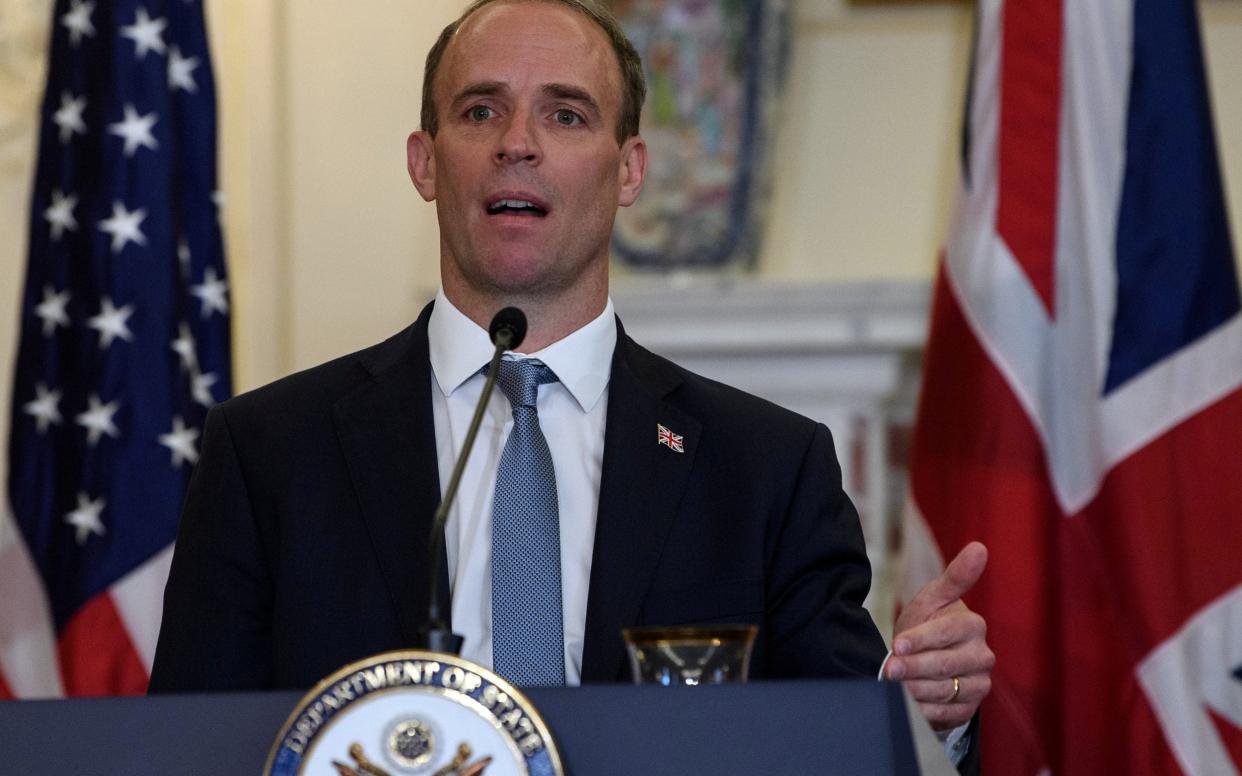Dominic Raab urges US politicians to turn fire on Brussels over Brexit talks

Dominic Raab, the Foreign Secretary, has urged US politicians to pressure Brussels into publicly ruling out a hard border on the island of Ireland, after the UK's own position was criticised by Democratic presidential nominee Joe Biden.
On the third day of a visit to Washington DC that risked being overshadowed by the very public warnings from Democrats over Brexit talks, Mr Raab used a CNN interview to try to turn the spotlight onto the European Union.
“I think it would be helpful for all those concerned about this to elicit the same unilateral, absolute commitment not to require any infrastructure at the border between the North and the South. So far it’s actually only the UK that has said that,” Mr Raab said.
He added: “I think actually if the EU did come out and make the same commitment it would also help the negotiations. So I hope our American colleagues will reinforce that point on both sides.”
The call for US political figures to row in behind Britain’s position is a reflection of how prominent the backlash against Boris Johnson’s proposed rewriting of the Brexit Withdrawal Agreement has been from senior Democrats.
Nancy Pelosi, the Democratic speaker of the House of Representatives, and a string of US congressmen have warned they would block a US-UK free trade deal if the Good Friday Agreement, the 1998 Northern Irish peace deal, was undercut in any way.
Critics have argued the Prime Minister's attempt to change elements of the Withdrawal Agreement which he approved less than a year ago means the UK, not the EU, is creating new instability in Northern Ireland.
Just as Mr Raab was meeting Ms Pelosi to discuss their differences on Wednesday, Mr Biden released a tweet backing up the Democratic Party's position.
“We can’t allow the Good Friday Agreement that brought peace to Northern Ireland to become a casualty of Brexit,” Mr Biden wrote in his first comments on the matter. “Any trade deal between the US and UK must be contingent upon respect for the Agreement and preventing the return of a hard border. Period.”

Such a public warning from a man who could be elected US president in a fewer than 50 days heaped pressure on the Johnson government and escalated the row.
Mr Biden prides his Irish heritage. He has visited Ballina in County Mayo where his ancestors are from and recalled how his grandfather used to tell him “the best drop of blood in you is Irish”.
Well-placed sources told The Daily Telegraph that the meeting between Mr Raab and Ms Pelosi was much less confrontational than their public statements, with the discussions described as “cordial”.
Ms Pelosi reinforced her strong support for the Good Friday Agreement, which the US played a critical role in securing, during the meeting. But topics, including climate change, were discussed at length as well.
Mr Biden’s intervention triggered a wave of criticism from Conservative MPs who are firm supporters of Brexit. Some likened the remarks to meddling in UK-EU negotiations.
Iain Duncan Smith told The Times: “We don’t need lectures on the Northern Ireland peace deal from Mr Biden. If I were him I would worry more about the need for a peace deal in the USA to stop the killing and rioting before lecturing other sovereign nations.”
David Davis, the former Brexit secretary, said: “Perhaps Mr Biden should talk to the EU since the only threat of an invisible border in Ireland would be if they insisted on levying tariffs.”
Asked if Mr Biden was wrong, a Number 10 spokesman said: “We will continue to work with our US partners to ensure our position is understood, but the whole point of this - as the PM has set out - is to make sure the Belfast/Good Friday Agreement is upheld.”


